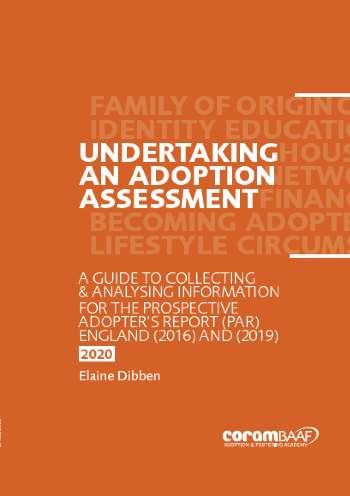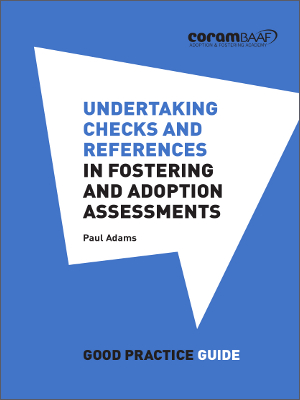This two-day open course will provide practitioners and particularly those who may be new to undertaking adoption assessments with an opportunity to develop knowledge, skills and practice in completing adoption assessments. Practitioners will be enabled to consider thorough, rigorous, consistent and fair approaches across the service in the assessment of prospective adopters. This course may also provide a refresher for those wanting to reflect and build on knowledge skills and best practice in the completion of adoption assessments.
LEARNING OUTCOMES
- To explore best practice in the completion of the Prospective Adopter’s Report (PAR)
- To practice and develop an integration of critical assessment tools and techniques within adoption assessments and current best practice
- To explore ways to consider prospective adopters in terms of their capacity to look after children in a safe and responsible way that meets the child’s needs
- Apply learning in the context of the legal framework
- To develop critical thinking and reflective practice in the completion of adoption assessments
- To consider ways of identifying prospective adopter’s competencies and strengths and areas they have or will need to develop
WHO SHOULD ATTEND?
Adoption social workers (particularly those new to adoption assessments), adoption team managers and adoption panel members who may wish to understand the assessment process in more detail.
For social workers, reflection on this session may contribute to your continuing professional development (CPD).
Total of 22 places available.
RESOURCES
This course will reference the CoramBAAF form, and you will be provided with a sample copy of the form as part of the pre-course resources. It will support your learning if you have access to the published Guidance that accompanies this form during the course. If you don’t already have it, the CoramBAAF licence holder within your organisation should be able to give you access to it. If you use another form, please bring a copy, so that you can use this when needed for relevant exercises and discussions during the day.
RECOMMENDED READING
Author: Elaine Dibben (2020)
The guide is primarily based on Part 1 of the PAR which pulls together information about the applicant – individual profile; family and environmental factors; present circumstances and becoming adopters. It now includes the additional experience, skills and understanding needed by prospective adopters in their role as foster carers when offering a Fostering for Adoption or concurrent planning placement, and ideas for evidencing the relevant skills and experience of foster carers wishing to adopt a child in their care.
Each section of the guide presents a list of trigger questions that can facilitate further discussion and encourage exploration of different areas and suggestions as to how this can be analysed to assess an applicant’s suitability, or not, to adopt.
Author: Paul Adams (2019)
The assessment of prospective foster carers and adopters is amongst the most important aspects of family placement work. Undertaking checks and references is a key part of these assessments, and a core task for social workers. But which checks are mandatory, and which are advisable? Which checks are needed in each UK country? Which are likely to yield the most useful information?
This Good Practice Guide details the range of checks routinely undertaken in England, Scotland, Northern Ireland and Wales, in both fostering and adoption.
This popular guide has been fully revised and updated to take into account all recent legislative and practice changes UK-wide. These include changes to take into account new GDPR and data protection legislation, particularly in terms of confidentiality with regard to references.
Case studies illustrate the issues to be considered, and the guide includes a range of sample forms and checklists to help collate and analyse information.
PRESENTER
Lindy Wootton, Associate Trainer, CoramBAAF
TIME
Registration 9.45 am
Start 10.00 am*
Close 4.00 pm*
*Times subject to change
FEES
Full or associate CoramBAAF member - £335.00 + £67.00 VAT = £402.00
Individual CoramBAAF member - £258.00 + £51.60 VAT = £309.60
Non-member - £465.00 + £93.00 VAT = £558.00
CONTACT
Telephone 020 7520 0310
Email training@corambaaf.org.uk
If you have access and/or dietary requirements, please click the left-hand bar at the checkout to let us know. Alternatively, contact us by email.
MEMBERSHIP DISCOUNT FOR OPEN COURSES
Log into your account before checkout to receive your membership discount. Don't have a login? Your organisation may already be in membership, if so set up your account quickly and easily here. Not a member of CoramBAAF? Read about the benefits of CoramBAAF membership for individuals and organisations.
Need help logging in? If you’re having trouble logging in, please see this page for help.


